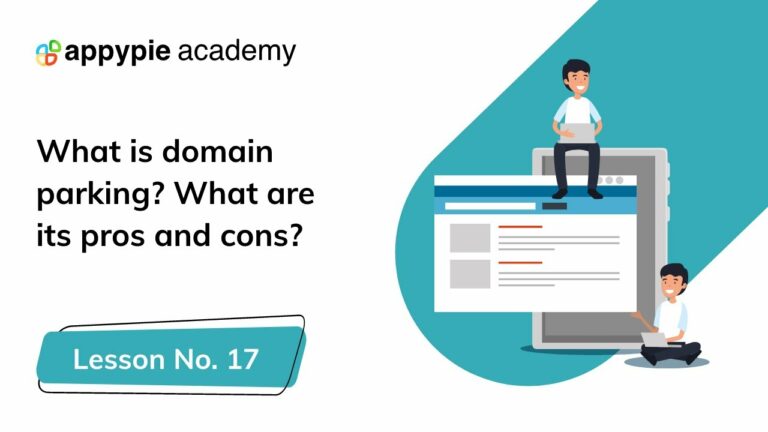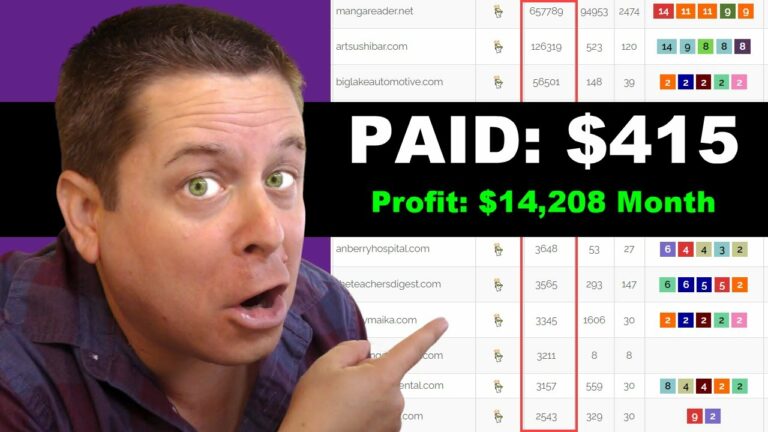The article “Legal Requirements for Making Money Online with the Godaddy Appraisal Tool” provides valuable information on how to use the Godaddy Appraisal Tool to make money online. The video discusses various apps and tools related to domain flipping, emphasizing the importance of legal requirements and compliance. The video showcases examples of domain names and their appraised values, as well as highlights the flaws of domain appraisal tools and strategies for finding profitable domain names. Additionally, the video offers a method for making money online with zero investment, making it accessible to a wide range of individuals.
The author of the article shares their expertise in buying and selling domain names profitably for 22 years, offering valuable insights and tips. They recommend using tools like GoDaddy Auctions, the Hoth free Keyword tool, and Spamzilla to find valuable domains based on their name and associated backlinks. The article also emphasizes the importance of evaluating a domain’s value based on its name alone and the traffic value it has. While the article acknowledges the potential profitability of buying and selling domains, it also highlights the risks involved and advises readers to follow all legal and disclosure requirements.
Legal Requirements for Making Money Online
Understanding the legal landscape
When it comes to making money online, it is important to understand and comply with the legal requirements that govern online business activities. While the laws and regulations may vary from country to country, there are some common legal considerations that apply in most jurisdictions. These include but are not limited to consumer protection laws, copyright laws, data protection and privacy laws, and advertising regulations. Ignoring or disregarding these legal requirements can result in serious consequences, including fines, legal action, and damage to your reputation.
Following online business regulations
To ensure that you are operating your online business legally, it is essential to familiarize yourself with the regulations that apply to your specific industry and jurisdiction. Some key areas to consider include obtaining the necessary licenses and permits, ensuring compliance with taxation laws, and adhering to advertising and marketing guidelines. It is also important to have a clear understanding of your legal obligations and to keep up to date with any changes in the law that may affect your business.
Complying with data protection laws
Data protection and privacy laws play a crucial role in online business activities, particularly if you handle and process personal data. It is essential to understand and comply with the data protection laws that apply to your jurisdiction, as well as any international regulations if you operate globally. This includes obtaining the necessary consent from individuals for collecting and processing their data, implementing appropriate security measures to protect the data you hold, and ensuring that you have the necessary procedures and policies in place to handle data breaches and respond to data subject requests.
Protecting intellectual property rights
When conducting business online, it is important to respect and protect the intellectual property rights of others. This includes trademarks, copyrights, patents, and trade secrets. It is essential to ensure that you have the necessary rights and permissions to use any intellectual property in your online business, whether it be images, logos, music, or written content. Violating intellectual property rights can result in legal action, damages, and loss of reputation. It is advisable to conduct thorough research and seek legal advice if you are unsure about your rights and obligations in relation to intellectual property.
Introduction to Godaddy Appraisal Tool
Overview and benefits of the app
The Godaddy Appraisal Tool is a free app that allows users to evaluate the value of domain names. By using the app, individuals can gain insights into the estimated worth of their domain names, which can be helpful when buying and selling domains or when offering domain-finding services. The app provides users with an approximate value for their domain based on the algorithm used by Godaddy. This can be a useful starting point for individuals looking to determine the potential value of their domain assets.
Evaluating the value of domain names
The Godaddy Appraisal Tool uses a range of factors to determine the estimated value of a domain name. These factors include the length and quality of the domain name, the presence of keywords, the level of competition in the market, the traffic potential, and the historical sales data of similar domains. By analyzing these factors, the app provides users with an estimate of the value of their domain name.
Comparison with other domain flipping tools
While the Godaddy Appraisal Tool is a popular option for evaluating domain values, there are also other domain-flipping tools available in the market. These tools may use different algorithms and factors to calculate appraisals, resulting in variations in the estimated values of domain names. It is important to consider multiple tools and sources when determining the value of a domain name to get a more comprehensive understanding of its potential worth.

Flaws and Limitations of Domain Appraisal Tools
Factors affecting appraised values
Domain appraisal tools, including the Godaddy Appraisal Tool, have limitations and may not always provide accurate or consistent appraised values. The algorithms used by these tools rely on various factors that may not fully capture the true value of a domain name. Factors such as market demand, website content, industry trends, and branding potential can significantly influence the perceived value of a domain and may not be fully accounted for in the appraisals generated by these tools.
Importance of considering multiple tools
Due to the limitations of domain appraisal tools, it is crucial to consider multiple tools and sources when assessing the value of a domain name. By comparing the appraised values generated by different tools, individuals can gain a more comprehensive understanding of the potential worth of their domains. Additionally, seeking expert advice and engaging in market research can provide valuable insights into the current market trends and demand for specific domain names.
Domain appraisal as an estimation, not a guarantee
It is important to remember that domain appraisal tools provide estimations and not guarantees of a domain’s value. The actual value of a domain is determined by the buyer’s willingness to pay, market conditions, and other external factors. While domain appraisal tools can provide a starting point for negotiations and pricing strategies, it is essential to conduct thorough market research and consider multiple factors before finalizing the value of a domain.
Finding Profitable Domain Names
Strategies for identifying valuable domains
Finding profitable domain names requires a strategic approach and thorough research. Some strategies to consider include identifying domain names with high-demand keywords, selecting short and memorable names, and targeting niche markets or industries. It is important to consider factors such as market trends, potential buyers, and future growth prospects when assessing the profitability of a domain name.
Importance of keyword-rich and short domain names
Domains that contain relevant keywords and are short and memorable tend to be more valuable. Keyword-rich domains can help improve search engine rankings and attract organic traffic, which can increase the value of the domain. Short and memorable domains are easier to remember, type, and share, making them more desirable to potential buyers.
Significance of backlinks from reputable sites
Backlinks from reputable websites can significantly increase the value of a domain name. Quality backlinks indicate that the domain is trusted and respected by other websites, which can positively impact its search engine rankings and visibility. When evaluating the value of a domain, it is essential to consider the quantity and quality of backlinks it possesses.
Exploring GoDaddy Auctions and Hoth free Keyword tool
GoDaddy Auctions is a platform where individuals can buy and sell domain names. It can be a valuable resource for finding profitable domain names, as it provides insights into current market trends and pricing. Additionally, the Hoth free Keyword tool can help identify keywords with high search volumes and low competition, which can be advantageous when selecting domain names.
Utilizing Godaddy closeouts and bargain bin
Godaddy closeouts and the bargain bin are sections of the GoDaddy website where domain names that have expired or are available at discounted prices are listed. These sections can be a goldmine for finding budget-friendly domain names with potential value. Conducting regular searches and monitoring these sections can uncover hidden gems at affordable prices.
Utilizing tools like Spamzilla for name and backlink analysis
Tools like Spamzilla can aid in finding valuable domains by providing insights into the domain name’s history, backlink profile, and other important metrics. By conducting a thorough analysis using tools like Spamzilla, individuals can identify domains with potential value based on their name, backlinks, and other relevant factors.
Assessing Domain Name Value
Considering the estimated value alongside actual sales
When assessing the value of a domain name, it is important to consider the estimated value provided by domain appraisal tools alongside actual sales data. Actual sales data can provide a more accurate indication of the market value of a domain, as it reflects the price that buyers are willing to pay for similar domains. By examining historical sales data and comparing it with the estimated value, individuals can gain a better understanding of the potential worth of a domain.
Factors affecting the price of domain names
Several factors can influence the price of a domain name. These include the demand for the domain, market trends, the presence of keywords, branding potential, the age and history of the domain, and the perceived value by potential buyers. It is important to consider these factors when determining the price of a domain and to conduct thorough research to assess market demand and trends.
Specifics of valuing hotel domain names
Valuing hotel domain names requires careful consideration of industry-specific factors. These factors include the location, reputation, and amenities associated with the hotel, as well as the tourism potential of the area. Additionally, the demand for hotel domain names can vary based on seasonal fluctuations and market trends. When valuing hotel domain names, it is important to consider these industry-specific factors and to conduct market research to assess demand and competition.
Case study of a hotel domain priced at $500
To illustrate the process of valuing a domain name, let’s consider a case study of a hotel domain priced at $500. In assessing the value of this domain, factors such as the hotel’s location, reputation, amenities, and market demand would be taken into account. Additionally, conducting research on comparable sales and analyzing market trends would provide valuable insights into the potential worth of the domain. By considering these factors, the seller and potential buyers can negotiate a fair price based on the estimated value and market conditions.
Where to Purchase Domain Names
Platforms for purchasing domains at low prices
Several platforms offer opportunities to purchase domain names at low prices. Some popular platforms include GoDaddy, Namecheap, and various domain marketplaces. These platforms often have a wide selection of domain names available for purchase, ranging from budget-friendly options to premium domains. It is important to conduct research and compare prices and features offered by different platforms to find the best deal for your specific needs.
Recommendations for GoDaddy and Namecheap
GoDaddy and Namecheap are two reputable and widely used platforms for purchasing domain names. GoDaddy offers a user-friendly interface, a vast selection of domain names, and competitive prices. Namecheap is known for its affordable pricing and excellent customer service. Both platforms provide domain registration and management services, making them convenient options for individuals looking to purchase domain names.
Utilizing websites like Spamzilla and expired lists
Websites like Spamzilla and expired lists can be valuable resources for finding domain names. Spamzilla provides insights into domain names’ histories, backlink profiles, and other important metrics, helping users identify valuable domains. Expired lists showcase domain names that have recently expired and are available for purchase. Regularly checking these websites can uncover hidden gems and opportunities to acquire domain names at reasonable prices.
Making Money by Finding Premium Domains
Exploring opportunities as a domain finder
One way to make money online with zero investment is by finding premium domains for others. As a domain finder, you can use your research skills and market knowledge to identify valuable domain names and offer them to potential buyers. This can be a lucrative business opportunity, as premium domains can command high prices in the market.
Platforms like Fiverr for offering domain finding services
Platforms like Fiverr provide opportunities for individuals to offer domain-finding services to potential buyers. By creating a gig on Fiverr, you can showcase your expertise in identifying valuable domain names and offer your services at competitive prices. This can be a great way to leverage your domain research skills and make money by helping others find valuable domains.
Tips for locating premium domains for others
Locating premium domains for others requires a strategic approach and a deep understanding of market trends and demands. Some tips for finding premium domains include conducting thorough market research, targeting niche markets or industries, and staying up to date with the latest industry trends. Additionally, building a network of potential buyers and utilizing platforms like Fiverr or social media can help you connect with potential clients and monetize your domain-finding skills.
Building and Ranking Websites for Profit
Monetization opportunities through traffic
Building and ranking websites can provide various monetization opportunities through the traffic generated by the website. Some common methods of generating revenue from website traffic include display advertising, affiliate marketing, sponsored content, and selling products or services directly on the website. By optimizing your website for search engines, creating valuable content, and driving targeted traffic, you can maximize the monetization potential of your website.
Utilizing free tools for website building and ranking
There are numerous free tools available for website building and ranking that can help you create and optimize your website without significant upfront costs. Website builders like WordPress, Wix, and Weebly offer user-friendly interfaces and a wide range of templates and plugins to customize your website. Additionally, free SEO tools like Google Analytics, Google Search Console, and keyword research tools can help you enhance your website’s visibility and rankings in search engine results.
Strategies for successful website monetization
To successfully monetize your website, it is essential to create high-quality content that resonates with your target audience. This content should be optimized for search engines and include relevant keywords to attract organic traffic. Additionally, implementing effective marketing strategies, such as social media promotion and email marketing, can help drive traffic to your website and increase revenue opportunities. It is important to regularly analyze and optimize your website’s performance to maximize its monetization potential.

Legal Considerations in Domain Buying and Selling
Understanding the risks and legal implications
When buying and selling domains, it is important to understand the risks and legal implications involved. Domain disputes, trademark infringement, and copyright violations are some of the potential legal issues that can arise in domain transactions. It is crucial to conduct thorough due diligence and ensure that you have the legal right to use and sell the domain name without infringing on the rights of others. Seeking legal advice and being aware of the applicable laws and regulations can help protect you from legal disputes.
Lawful practices for domain flipping
Domain flipping, which involves buying domains at a lower price and selling them at a higher price, can be a profitable business venture when conducted lawfully. It is important to follow ethical practices when flipping domains, such as accurately representing the value and history of the domain, disclosing any known issues or limitations, and complying with legal requirements related to domain sales. By adhering to these practices, you can build a reputable and successful domain-flipping business.
Protecting yourself from legal disputes
To protect yourself from potential legal disputes, it is advisable to take certain precautions when buying and selling domains. These precautions include conducting thorough research on the domain’s history and ownership, keeping records of all transactions and communications, and using escrow services for secure transactions. Additionally, obtaining appropriate legal advice and understanding the applicable laws and regulations can help you mitigate the risk of legal disputes.
In conclusion, making money online through domain flipping and website building can be a lucrative business opportunity. However, it is crucial to understand and comply with the legal requirements that govern online business activities. By following the legal landscape and complying with regulations, individuals can ensure that they operate their online businesses ethically and avoid legal consequences. The Godaddy Appraisal Tool can assist in assessing the value of domain names, but it is important to consider its limitations and use multiple tools and sources when valuing domains. Finding profitable domain names requires strategic research, considering factors such as keywords, backlinks, and market trends. Platforms like GoDaddy and
Namecheap provides opportunities to purchase domain names at low prices, and websites like Spamzilla and expired lists can uncover valuable domain name opportunities. Individuals can also make money by finding premium domains for others and offering domain-finding services on platforms like Fiverr. Building and ranking websites can generate revenue through traffic monetization, and utilizing free tools can aid in website building and ranking. Legal considerations, such as protecting intellectual property rights and following lawful practices, are essential in domain buying and selling. By understanding the legal landscape and taking necessary precautions, individuals can make money online while minimizing legal risks.




